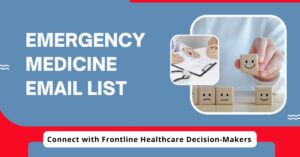Healthcare surveys go beyond simple questionnaires—they serve as essential tools for gaining deep insights into user experiences, staff performance, and overall healthcare operations. Their significance in the healthcare industry is undeniable, as they help enhance consumer care, support medical research, and influence the future of healthcare delivery. In this blog post, we will delve into the importance of surveys and their role in creating a more effective healthcare system.
Why Surveys Matter in Healthcare
The importance of surveys for the healthcare industry stems from their ability to provide data-driven insights across various critical areas:
- Optimizing Healthcare Services for Better User Satisfaction: Surveys provide users with a platform to share their feedback on various aspects of their care, including appointment scheduling and interactions with healthcare professionals. This valuable input enables hospitals to pinpoint areas for enhancement and foster a more consumer-centric approach. For instance, if a survey highlights extended wait times, the hospital can take steps to optimize its scheduling system for greater efficiency.
- Improving service quality and healthcare outcomes: By gathering data on consumer experiences and treatment results, healthcare providers can pinpoint best practices and areas that require improvement. Surveys help monitor treatment effectiveness and detect potential risks, ultimately enhancing consumer outcomes.
- Supporting medical research and innovation: Surveys play a crucial role in collecting data for epidemiological research, clinical trials, and public health programs. They enable researchers to analyze disease trends, assess the effectiveness of new treatments, and identify key factors influencing health and well-being. For example, a survey might examine the prevalence of specific health conditions in a community, guiding targeted public health initiatives.
- Ensuring compliance with healthcare regulations: Healthcare regulations often mandate organizations to gather and report data on consumer satisfaction and care quality. Surveys assist providers in complying with these requirements while showcasing their dedication to delivering high-quality healthcare.
- Measuring staff satisfaction and performance: Surveys can also collect valuable feedback from healthcare professionals, helping to enhance staff morale, identify training needs, and foster a more supportive work environment. Engaged and satisfied staff are more likely to deliver high-quality consumer care.
Key Healthcare Survey Categories
The importance of surveys for the healthcare industry is reflected in the diverse types of surveys used:
- Consumer satisfaction surveys: These surveys evaluate consumer experiences across different aspects of their care, such as doctor communication, wait times, and the overall hospital setting.
- Healthcare provider feedback surveys: These surveys collect feedback from doctors, nurses, and other healthcare professionals on topics like workload, available resources, and professional development opportunities.
- Public health and epidemiology surveys: These surveys gather information on health behaviors, ailments prevalence, and various factors impacting public health.
- Employee engagement and workplace wellness surveys: These surveys evaluate employee morale, job satisfaction, and workplace perceptions.
- Market research surveys for healthcare businesses: These surveys provide healthcare businesses with insights into market trends, consumer preferences, and the competitive sphere.
How Surveys Support Strategic, Data-Backed Decisions
Surveys play a vital role in the healthcare industry by providing actionable data. Healthcare organizations leverage survey insights to:
- Drive quality improvement initiatives.
- Design new programs and services.
- Optimize resource allocation.
- Monitor progress over time.
- Make data-informed strategic decisions.
Pitfalls in Conducting Healthcare Surveys
Although surveys are essential for the healthcare industry, several challenges must be managed:
- Survey fatigue: Users and staff may feel overwhelmed by frequent survey requests.
- Data privacy concerns: Safeguarding the confidentiality of survey responses is critical.
- Minimizing bias: Careful survey design and administration are necessary to ensure objective and reliable responses.
Best Approaches to Conducting Healthcare Surveys
To enhance the effectiveness of surveys in the healthcare industry, consider these best practices:
- Craft clear and concise questions.
- Ensure confidentiality of responses.
- Leverage technology to boost response rates.
- Provide incentives for participation when appropriate.
- Analyze survey data and implement actionable insights.
The Next Generation of Healthcare Surveys
The future of healthcare surveys looks promising. Innovations like AI, automation, and predictive analytics are improving survey accuracy and efficiency. For instance, AI-driven chatbots can conduct surveys and collect data in a more interactive and engaging manner. These advancements will continue to enhance the role of surveys in the healthcare industry.
Final Thoughts
The significance of surveys in the healthcare industry cannot be overstated. Well-designed surveys generate valuable data that drive improvements in consumer care, support medical research, and optimize healthcare management. By implementing best practices and utilizing technological advancements, healthcare organizations can maximize the impact of surveys and contribute to a healthier future. Want to enhance your healthcare organization? Begin by gathering insights from consumers and staff through effective surveys.
Visit our website Med Stream Data for more healthcare industry related information!







